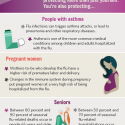Target heart rate

When you’re working out, how do you know if you are working hard enough or too hard? It’s a question that exercise professionals get asked often, and it’s a simple one to answer. The best way to know is by monitoring your heart rate to ensure that you are in your target heart rate zone, or the zone prescribed by your health care provider. In an earlier post I covered the basics of heart rate. If you missed it, you can find it here.
Maximum heart rate
One calculation needed to find target heart rate is your maximum heart rate. Maximum heart rate is the highest your pulse rate can go. There is a formula you can use to estimate this number:
- Take your age and subtract it from 220. This number is your predicted maximum heart rate.
What is target heart rate?
When you work within your target heart rate zone, you’re taking full advantage of the benefits of exercise . In most cases, target heart rate zone is 60 to 80 percent of your maximum heart rate. It’s important to talk to your health care provider about their recommendations based on your health conditions.
How do you measure target heart rate?
Monitoring your heart rate is easy. You can use a heart rate monitor or you can stop and use the 10-second pulse count method:
- Take your heart rate at either the base of the thumb on the palm side of the wrist or the base of the neck on either side of your windpipe.
- Using two or three index fingers, press lightly on the skin until you can feel the blood moving underneath it.
- Count the beats you feel for 10 seconds and multiply by six.
Some tips for using target heart rate:
- Always check with your health care provider before starting an exercise program to identify your needs and goals to stay within a safe target range.
- Do not exercise above 85% of your maximum heart rate range. Doing so increases risk with minimal benefit.
- If you are new to an exercise program, it’s important to gradually build up to an exercise level within your target heart rate zone.
- Always consider your physical condition, goals, and abilities when using target heart rate to evaluate your exercise program.
It’s important to note that some medicines and medical conditions can have an affect your maximum heart rate and target heart rate recommendations. If you are taking medicines or have a medical condition (such as heart disease, high blood pressure, or diabetes), always be sure to partner with your doctor to evaluate if your maximum heart rate and target heart rate will be affected. In those cases your heart rate ranges for exercise should be prescribed by your doctor or an exercise specialist.



